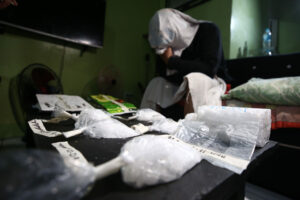AROUND 70-80% of crimes in Southeast Asia are linked to drugs, Bureau of Corrections (BuCor) Director General Gregorio Pio P. Catapang, Jr. said on Monday, following the conclusion of the Association of Southeast Asian Nations (ASEAN) Regional Correctional Conference (ARCC).
Drugs emerged as the common problem during high-level discussions among correctional leaders, he told reporters on the sidelines of the ARCC in Puerto Princesa City, Palawan.
“Seventy to eighty percent of crimes committed were under the influence of drugs,” Mr. Catapang said in mixed English and Filipino. “That’s the similarity among ASEAN countries; drugs were always highlighted as a problem.”
Mr. Catapang said that to address prison overcrowding over drug-related cases, he aims to revitalize the underused Mega Drug Abuse Treatment and Rehabilitation Center in Palayan City in Nueva Ecija, built during former President Rodrigo R. Duterte’s administration.
“If possible, with the help of the Department of Health (DoH), since this is a whole-of-government approach involving DoH, Department of Social Welfare and Development, Technical Education and Skills Development Authority and others—the individual can first be confined [in the rehabilitation center],” he said in Filipino.
This aligns with the home imprisonment mechanism for minor crimes, which was shared during ARCC discussions. This mechanism will also cover smaller drug-related crimes after undergoing rehabilitation.
“Once it is proven that they are no longer addicted and have overcome their addiction, they can be reintegrated with their family,” he added. “Their family, along with the community and the village, will then monitor and support them.”
The event also concluded with an emphasis on aligning ASEAN correctional policies with global trends, including the potential establishment of a regional prisoner transfer agreement after the transfer of Mary Jane F. Veloso to Manila from Jakarta in December 2024.
Once approved at the executive level, this agreement would enable countries to repatriate inmates to their home nations to serve their sentences, improving rehabilitation outcomes and reducing the burden on host countries.
Mr. Catapang, however, emphasized that this agreement should reach the treaty level, which would take years to accomplish.
Moving forward, ASEAN leaders agreed to hold the ARCC every two years, with Thailand set to host the next conference in 2026 and two years moving forward.
To ensure meaningful discussions, ASEAN officials plan to strengthen the ARCC Secretariat to maintain continuity and clear objectives for future conferences. — Chloe Mari A. Hufana

